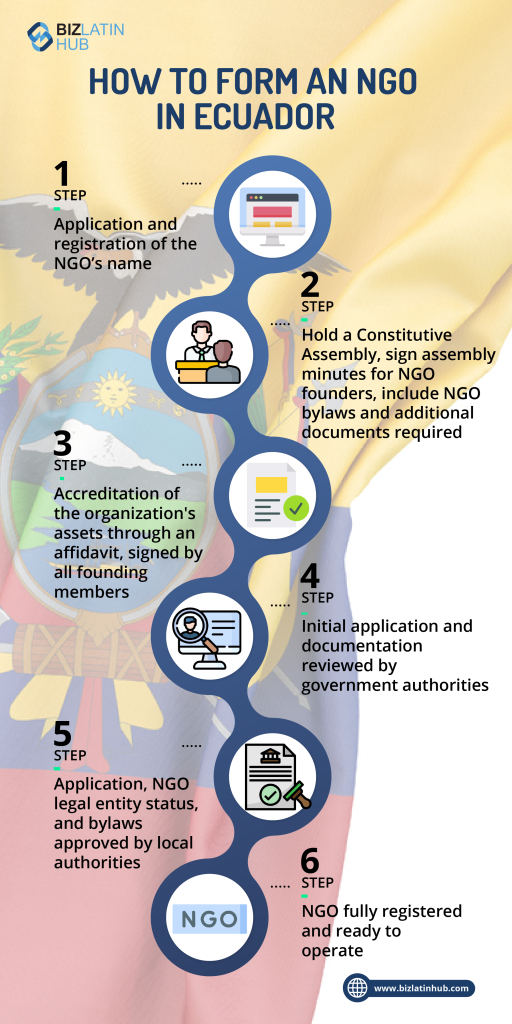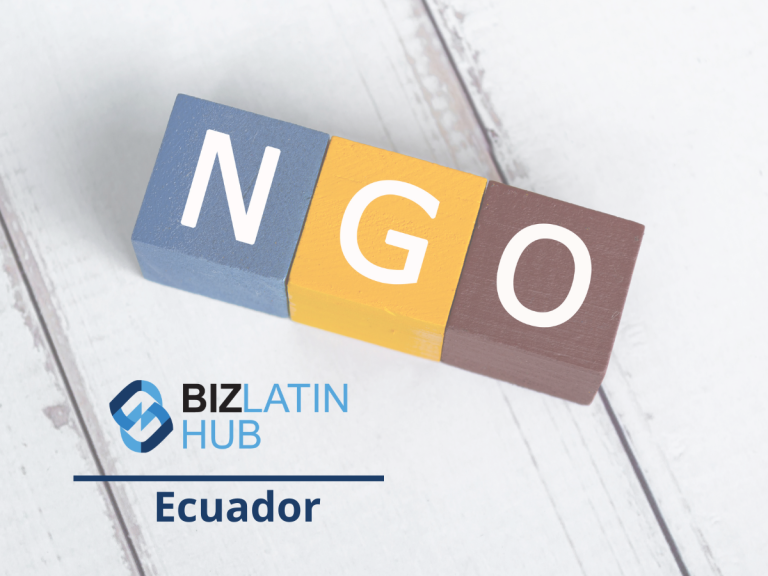This South American country may be well known for its tropical beauty, vibrant culture, and market-friendly policies. But something not so well known is that the country is a hotspot for Non-Governmental Organizations, or NGOs in Ecuador.
There are nearly 5,000 registered NGOs in Ecuador, and hundreds more private charities and nonprofit organizations dedicated to feeding the hungry, pulling people out of poverty, protecting the environment and groups that are dedicated to animal conservation because of its variety of natural resources, etc. Just like company formation in Ecuador, it pays to know the lay of the land before you invest.
Biz Latin Hub can help people looking to set up NGOs in Ecuador, or who are looking at market entry. In either case, not only can we set you up and put you on the path to success, but we can also provide a full suite of market leading back-office services. This means you can focus on your day-to-day business while we make sure you are fully legally compliant.
What purpose do NGOs in Ecuador serve?
Successive governments in Ecuador have had limited progress in helping their most vulnerable citizens; local and foreign NGOs have popped up in recent years to succeed where authorities have failed.
The aims of NGOs, charities, civil society organizations, religious groups and a mish-mash of volunteer groups vary, but some of their causes include:
- Feeding people suffering from severe hunger
- Eradicating child malnutrition
- Childhood education programs for at-risk youth
- Women’s empowerment initiatives
- Programs to help poor farmers
- Support the rights of Indigenous communities
- Support groups for survivors of sexual/gender violence
- Protect the Ecuadorian rainforest
- Marine wildlife conservation in the Galapagos Islands
- Animal conservation programs in the Amazon
In 2017, former President Lenin Moreno did away with the restrictions imposed by the previous administration and made the process of incorporating NGOs in Ecuador easier. The administration of Guillermo Lasso was also supportive of NGOs in Ecuador and laid out clear guidelines for incorporation, including registering the NGO with Ecuador’s Ministry of Economic and Social Inclusion.

The helping hand given by NGOs in Ecuador
In the face of economic hardship, NGOs in Ecuador have become a kind of unofficial social safety net for impoverished communities. As such, these NGOs and social organizations can be credited with:
- Helping people meet their basic nutritional needs.
- Coordinating sustainable development initiatives in rural areas.
- Ensuring that poor communities have access to clean drinking water.
- Launching dozens of local recycling campaigns around the country.
- Empowering single mothers and women from low-income backgrounds.
- Running children’s meal programs, and childhood education.
- Helping preserve the Galapagos Islands ecosystem and endangered animals.
- Rehabilitating trafficked animals.
- Help curb the rampant deforestation in the country.
- Raised millions of dollars in donations, and funding to finance these types of projects.
Opening an NGO in Ecuador: An updated 6-step guide
What follows are the six steps an organization needs to take in order to establish an NGO, foundation or social welfare organization in Ecuador:

- Step 1 – Select and register a name – The organization must first apply for and receive the approval of your NGO’s name and mission, and this must be done at the Ministry of Economic and Social Inclusion, or the Ministry of Environmental Protection, depending on the type of NGO it will be (social or environmental in focus).
- Step 2 – Provide details about the NGO’s founders – The meeting minutes of the General Constituent Assembly, including attendance and statements made by the founders of the social organization must be submitted.
- Step 3 – Provide copies of the NGO’s Charter – Two hard copies of this document are necessary.
- Step 4 – Submit an Affidavit – That outlines specifically where the NGO’s finances will be coming from. This document must be signed by all the organization’s founders.
- Step 5 – Four-year operational plan – the NGO must present its operational plan (POP) to the competent authorities, in which it will detail the information of who finances it, how many people it will hire and what its projected activities will be for 4 years.
- Step 6 – Request for no objection to the ministry – The NGO must send its operational plan to the ministry where its work is concentrated (for example: a natural conservation NGO must submit a request to the Ministry of the Environment). The ministry will review the planned activities and issue a certificate of no objection to the NGO. This document is essential to be able to form the entity.
Additionally, the applicant must be very clear about the purpose of the NGO, such as how the social services provided by the organization impact marginalized and/or poor communities. It’s best to hire a local expert, in this case an Ecuadorian attorney, to handle all the paperwork and processing on the NGO’s behalf, and to ensure that the requirements for the opening of an NGO have been met.
As a matter of procedure, the formally submitted application to open an NGO in Ecuador takes between 4 and 6 months to be processed and receive approval from the Ministry of Economic and Social Inclusion and/or the Ministry of Environmental Protection.

FAQs on NGOs in Ecuador
Yes, foreign ownership is 100% allowed for most projects.
In the face of economic hardship, NGOs in Ecuador have become a kind of unofficial social safety net for impoverished communities. As such, these NGOs and social organizations can be credited with:
Helping people meet their basic nutritional needs.
Coordinating sustainable development initiatives in rural areas.
Ensuring that poor communities have access to clean drinking water.
Launching dozens of local recycling campaigns around the country.
Empowering single mothers and women from low-income backgrounds.
Running children’s meal programs, and childhood education.
Helping preserve the Galapagos Islands ecosystem and endangered animals.
Rehabilitating trafficked animals.
Help curb the rampant deforestation in the country.
Raised millions of dollars in donations, and funding to finance these types of projects.
As a matter of procedure, the formally submitted application to open an NGO in Ecuador takes between 4 and 6 months to be processed and receive approval from the Ministry of Economic and Social Inclusion and/or the Ministry of Environmental Protection.
Step 1 – Select and register a name – The organization must first apply for and receive the approval of your NGO’s name and mission, and this must be done at the Ministry of Economic and Social Inclusion, or the Ministry of Environmental Protection, depending on the type of NGO it will be (social or environmental in focus).
Step 2 – Provide details about the NGO’s founders – The meeting minutes of the General Constituent Assembly, including attendance and statements made by the founders of the social organization must be submitted.
Step 3 – Provide copies of the NGO’s Charter – Two hard copies of this document are necessary.
Step 4 – Submit an Affidavit – That outlines specifically where the NGO’s finances will be coming from. This document must be signed by all the organization’s founders.
Step 5 – Four-year operational plan – the NGO must present its operational plan (POP) to the competent authorities, in which it will detail the information of who finances it, how many people it will hire and what its projected activities will be for 4 years.
Step 6 – Request for no objection to the ministry – The NGO must send its operational plan to the ministry where its work is concentrated (for example: a natural conservation NGO must submit a request to the Ministry of the Environment). The ministry will review the planned activities and issue a certificate of no objection to the NGO. This document is essential to be able to form the entity.
Biz Latin Hub can help NGOs in Ecuador
At Biz Latin Hub, we provide integrated market entry and back-office services throughout Latin America and the Caribbean, with offices in Quito, as well as over a dozen other major cities in the region. We also have trusted partners in many other markets.
Our unrivaled reach means we are ideally placed to support multi-jurisdiction market entries and cross border operations.
As well as knowledge about establishing an NGO in Ecuador, our portfolio of services includes accounting & taxation, company formation, bank account opening, and corporate legal services.
Contact us today to find out more about how we can assist you in finding top talent, or otherwise do business in Latin America and the Caribbean.
If this article on NGOs in Ecuador was of interest to you, check out the rest of our coverage of the region. Or read about our team and expert authors.





